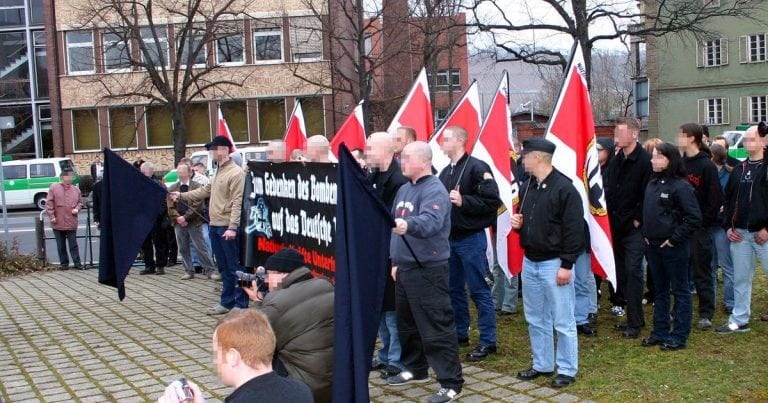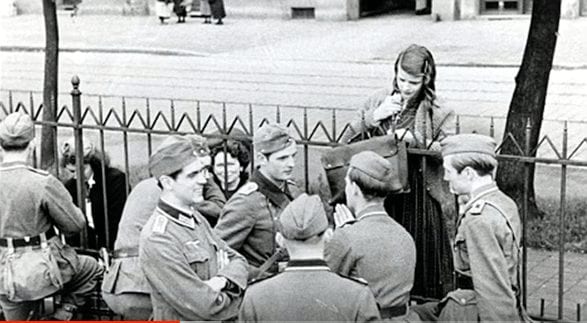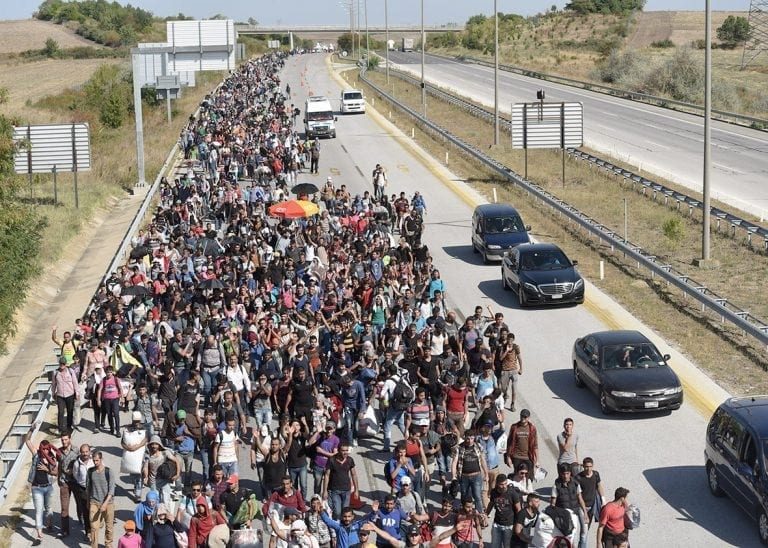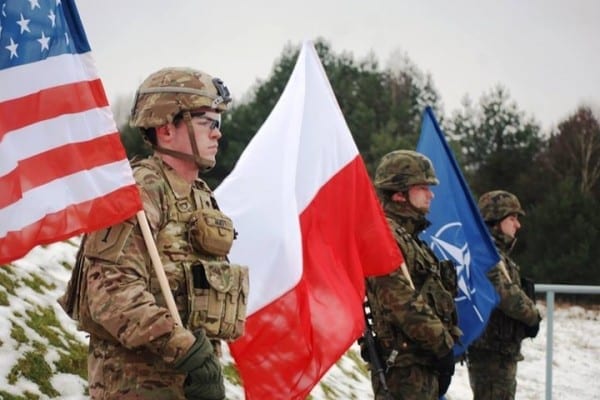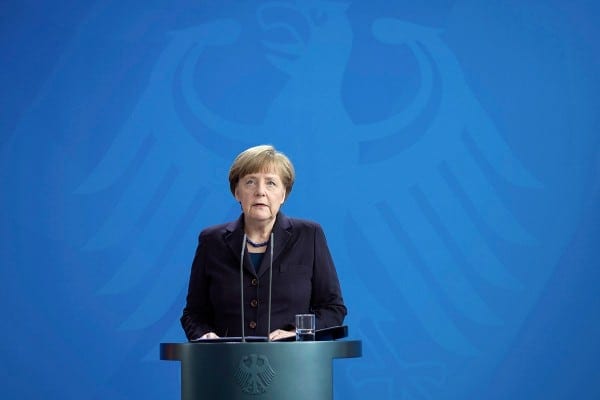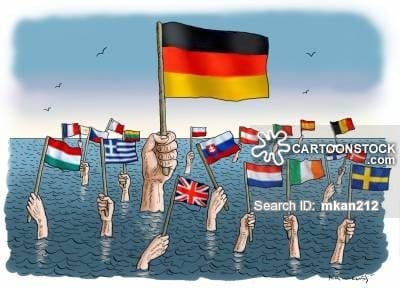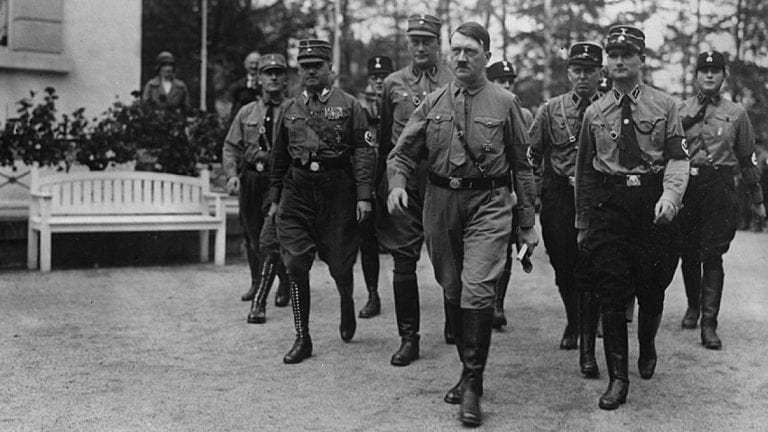Germany, Israel, Palestine, Neo-Nazis, Refugees, Roger Waters, BDS, and “Antisemitism”: Very. Complicated.
Pink Floyd always was, and still is, wildly popular and successful here in Germany. The legendary rock group’s former bass player and singer, Roger Waters (above), still has quite a following here too as a successful solo artist. That following does not, however, include the German government, nor does it include supporters of the current government of Israel, who last fall successfully petitioned the broadcasting honchos who run Germany’s public television network ARD to drop a planned live concert by Mr Waters from the programming schedule. The grounds: as a supporter of the BDS boycott movement and a passionate advocate of justice for Palestine, Waters was accused of being an “antisemite”.
Israel’s interests, whether real or imagined, carry a good bit of weight here in the former stomping grounds of Herr H and his millions of supporters, which included a great many who simply had no idea what was going on in those concentration camps -- if they are to be taken at their word -- and now there are even more millions of their children and grandchildren who sincerely feel deep shame and revulsion at what was done by their relatives and their country. Understandably, they want the world to know that times have changed in the land where the Holocaust was organized and administered.
Jews were not the only group targeted and murdered en masse, which may come as a surprise to some. But thanks to what the courageous academic, author, and crusader for Palestinian rights Dr. Norman Finkelstein calls Israel’s and Judaism’s “Holocaust Industry”, there is no danger that those Jewish victims of Nazi bloodlust will ever be forgotten. This cannot necessarily be said of the many Sinti and Roma, gays, disabled persons and others who shared that horrible fate. [Not to mention communists, socialists and other sworn political foes of fascism.] We don’t know how many of those others were wiped out, but we all know how many Jews were murdered: six million. Most people who are not illiterate can tell you that number immediately. Dr. Finkelstein is a Jew, both of whose parents were interned in concentration camps by the Nazis. It should not be possible to tar him as an “antisemite” but the Israeli government does it anyway, as is also the case with members of the group Jewish Voice for Peace and many other Jews now banned from entering the country. Finkelstein’s honesty and passion for justice also cost him a professorship at DePaul University. His new book has just been published.
Times have in fact changed. Hundreds of thousands of Jewish persons are now living in Germany again, their numbers growing pretty rapidly. A great many of them are young people moving from Israel to live in ultra-hip Berlin. I have never been in Israel, although for years I was related by marriage to a good many orthodox Jews, but I have been in Berlin many times and I can easily imagine that it might be more pleasant for many young Israelis to blend into that multicultural megalopolis than to remain at the eye of the Zionist storm, especially if one does not identify strongly with the religious aspects of Israeli culture (as many of these Israeli immigrants do not).
Berlin is surrounded by the former Deutsche Demokratische Republik, communist East Germany as it was then, now once again part of the (dare I say it?) Fatherland. Most East Germans could not be reunified with the Klassenfeind (“class enemy”) fast enough after the “fall of the wall” in 1989, but these days an awful lot of them are very disillusioned and disappointed, as are many others in the former Soviet Bloc. The majority of those Eastern Europeans renounced the official socialist ideology with obvious pleasure, having apparently never taken it terribly seriously except to the extent one had to in order to stay out of trouble. They tried to walk the capitalist walk and they expected to be welcomed as long-lost brothers. And in many newspaper editorials and speeches by politicians, they were. But 28 years after reunification, in practice those in East Germany are still the objects of West German scorn and arrogance. Many of them have repaid that ongoing slight and condescension by adopting the views and politics of the aforementioned Herr H, expressing their hatred of foreigners, immigrants, refugees and Jews at the drop of a hat, and in many cases going a good bit farther. In some recent years the number of attacks on foreigners and refugees by Germans has reached one thousand for a single year, although it is the rare violent crime by a refugee here that the media continues to find much more horrifying and newsworthy.
Not all German Neo-Nazis and associated sympathizers are East Germans, not by a long shot, but it is fair and accurate to say that the center of ultra-right-wing evil here is the federal state of Saxony. Where Bach and Wagner once made musical history, a different cultural phenomenon is now growing rapidly, and in Saxony that fact actually made the xenophobic Alternative für Deutschland (AfD) Saxony’s biggest political party in the September 2017 parliamentary election (see my article “The German Election: The West’s Nervous Breakdown Continues”). Nationwide, the party hauled in almost 13% of the vote, taking so much support from the ruling Christian Democrats and Social Democrats that, four months later, attempts to form a new governing coalition have not yet succeeded.
[dropcap]S[/dropcap]o in Berlin, we now have a large number of Jews living in a single city surrounded by a population which nourishes quite a lot of Neo-Nazi hatred of Jews and immigrants and refugees. It is no surprise that this causes the German government great anxiety. The government was also mortified and embarrassed when a group of demonstrators, which allegedly included many Muslim immigrants, burned Israeli flags at a recent public demonstration in Berlin. That demonstration was organized in response to US President Donald Trump’s announcement that he had decided to move the US embassy in Israel to Jerusalem. This flag-burning so infuriated conservatives in the government – who had already spent much of the last year trying to outdo each other with public displays of anti-refugee zeal, and proposing new measures to deport as many refugees as possible – that they immediately began to demand the deportation of any immigrants unwilling to “accept Israel’s right to exist”, and began as well to propose major new programs and laws against antisemitism. The political dimension of the demonstration was practically never mentioned.
As we have seen, the government here brands most criticism of Israel, including virtually everything to do with the BDS boycott movement, as “antisemitism”. While the German government joins the rest of the EU in officially opposing Israeli settlements in occupied Palestinian territory, calling them “obstacles to peace”, in practice it demands no changes in that policy in exchange for European weapons sales and other support for the Israeli government and military -- exactly like Israel’s Ally Number One, the USA. Last year the German Foreign Minister and Vice-Chancellor Sigmar Gabriel was snubbed and publicly humiliated by Israeli Prime Minister Netanyahu, who refused to meet with him as scheduled, after Gabriel visited some groups of pro-Palestinian activists in an embarrassingly pathetic and transparent attempt to show some “balance”. Once again, reference was made to the long-dead “Peace Process” as if it still existed. Even this, however, was too much for Bibi, who had not been informed in advance, and immediately cancelled his own scheduled subsequent meeting with Gabriel in a raging hissy-fit, leaving the latter with egg on his face to stammer mild expressions of surprised concern to the media. Gabriel, in typical obsequious German grovel-before-Israel fashion, insisted that while it was all a bit overdone and unnecessary, it would not harm Germany’s ties with Israel in the slightest. Which really says it all, in a nutshell.
In a speech last year, the German Head of State, President Frank-Walter Steinmeier – himself for many years the Foreign Minister under Merkel, and a former failed Social Democratic candidate to replace her as Chancellor – referred darkly to alleged poorly-disguised antisemitism as the true motive behind much left-wing criticism of Israeli policy. As outrageous as I found this assertion, I was even more outraged by the fact that I heard not one word of public criticism of this sneering smear in subsequent media reaction to the speech. Germany has groveled before Israel so habitually for so long that it is hard to imagine what it would take to arouse any real resistance here to Israeli apartheid and war crimes. During last year’s international arts festival “Documenta”, which takes place every year here in part with government support, the performance of a scheduled theatrical production called “Auschwitz On the Beach” -- which attempts to draw attention to the disgraceful manner in which Germany and the EU are complicit in the drowning deaths and Libyan captivity, torture and slavery of refugees attempting to reach Europe -- was also cancelled. Many Jews and supporters of Israel were furious at the implied comparison between these refugee deaths and the Holocaust, which must in their opinion always be treated as an unparalleled crime unique in history. The festival’s staff quickly capitulated and the only thing most people ever saw of the work was the subsequent controversy, having been denied the opportunity to see it and make their own judgements.
In his 2011 address to the Palestine Center in Washington DC on the occasion of the annual Shirabi Lecture, retired US diplomat Chas Freeman stated: “… the cruelties of Israelis to their Arab captives and neighbors, especially in the ongoing siege of Gaza and repeated attacks on the people of Lebanon, have cost the Jewish state much of the global sympathy that the Holocaust previously conferred on it. The racist tyranny of Jewish settlers over West Bank Arabs and the progressive emergence of a version of apartheid in Israel itself are deeply troubling to a growing number of people abroad who have traditionally identified with Israel. Many – perhaps most of the most disaffected – are Jews. They are in the process of dissociating themselves from Israel. They know that, to the extent that Judaism comes to be conflated with racist arrogance (as terrorism is now conflated with Islam), Israeli behavior threatens a rebirth of antisemitism in the West. Ironically, Israel – conceived as a refuge and guarantee against European antisemitism – has become the sole conceivable stimulus to its revival and globalization. Demonstrably, Israel has been bad for the Palestinians. It is turning out also to be bad for the Jews …”
In the same address Ambassador Freeman stated: “Examples of criminal conduct include mass murder, extra-judicial killing, torture, detention without charge, the denial of medical care, the annexation and colonization of occupied territory, the illegal expropriation of land, ethnic cleansing, and the collective punishment of civilians, including the demolition of their homes, the systematic reduction of their infrastructure, and the de-development and impoverishment of entire regions. These crimes have been linked to a concerted effort to rewrite international law to permit actions that it traditionally prohibited, in effect enshrining the principle that might makes right.
“As the former head of the Israeli Defense Forces’ (IDF) Legal Department has argued:
“ ‘If you do something for long enough the world will accept it. The whole of international law is now based on the notion that an act that is forbidden today becomes permissible if executed by enough countries . . . International law progresses through violations.’ “
In the seven years since those words were written, the situation has only worsened. It is clear to any open-minded observer that much of what the German and Israeli governments insist on describing as growing “antisemitism” is actually growing international revulsion in response to the policies and war crimes of the Israeli government and military, policies and crimes committed with plenty of support from the USA and the EU. Of course there are, and always were, bigots and racists and Neo-Nazis who would and will hate all Jews whatever happens in Palestine. Their numbers may be growing somewhat as well, or they may simply be growing more outspoken about views they have always held, in the current epidemic of nationalist hysteria nourished in particular by social media. But to continue to assert that the true antisemites and the rapidly growing number of persons worldwide – including millions of Jews – who vehemently oppose Israeli ethnic cleansing and military occupation are all motivated by antisemitism, is to be willfully blind.
It does credit to Germany that its citizens and political elites sincerely wish to atone for the sins of the Nazis. It is a crime, however, to insist that Palestinians should pay the price for that atonement.
In fact, many of Germany’s allies have never expressed much regret over their own genocide, massacres, and ethnic cleansing – whether the extermination of 100 million Native Americans in the United States, the murder of an estimated 60 million persons in India under British rule, or the brutal elimination of 10 million in the Congo by Belgium – and Germany itself is refusing demands to pay reparations to Poland and Namibia. But direct reparations to the victims of such historic horrors and their survivors, whether feasible or not, would certainly be a more just means of atonement than support of a colonial racist regime which is itself committing slow genocide against an imprisoned and largely defenseless population.
Germany adds insult to injury when it enshrines in government policy the vicious lie, echoing those equally vicious smears from Tel Aviv, that passionate advocates of the Palestinian cause are motivated by racism.
(Gregory Barrett is an American translator, musician and writer living in Germany.)
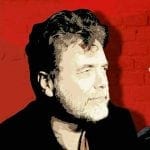 Gregory Barrett, originally from Tennessee, worked for 40 years as a professional pianist, singer, songwriter, and touring and recording musician in the USA and Europe, both in the spotlight and as an accompanist for major stars and others. His activist career includes stints in the 1980s with Amnesty International USA at the national level and the ACLU of Tennessee. Since 2012 he has worked primarily as a translator. He has lived in Germany for a total of 18 years and has a diverse, multicultural family. His commentary and essays are published in The Greanville Post, Counterpunch, the Anglo-Indian magazine Socialist Factor, and other publications.
Gregory Barrett, originally from Tennessee, worked for 40 years as a professional pianist, singer, songwriter, and touring and recording musician in the USA and Europe, both in the spotlight and as an accompanist for major stars and others. His activist career includes stints in the 1980s with Amnesty International USA at the national level and the ACLU of Tennessee. Since 2012 he has worked primarily as a translator. He has lived in Germany for a total of 18 years and has a diverse, multicultural family. His commentary and essays are published in The Greanville Post, Counterpunch, the Anglo-Indian magazine Socialist Factor, and other publications. 


